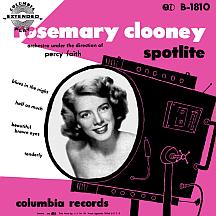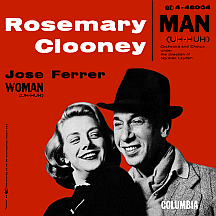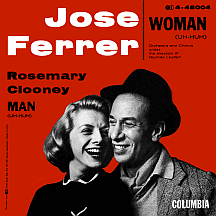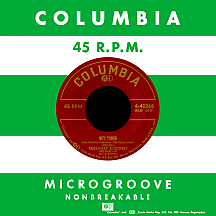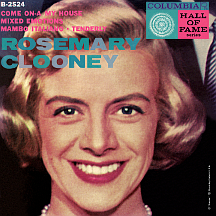ROSEMARY CLOONEY
Dysfunctional families may not be necessary in the show business world, yet being born into one seems to have fed many a person's drive to succeed. Rosemary Clooney, in various interviews over the years, claimed to be from one such family. Andrew Clooney prioritized alcoholic beverage over raising his children; his wife, Frances, also had little time for her eldest daughter (born Rose Mary in 1928 in Maysville, Kentucky, a small town about 60 miles southeast of Cincinnati, Ohio), sister Betty (who came three years later) and brother Nick (three years after that). Growing up mostly with grandparents, uncles and aunts, the three siblings (not to mention several half-sisters, step-brothers and what have you) seldom found themselves under one roof for any great length of time. This chaotic family life didn't stop Rosie and Betty from pursuing an interest in music after mom and pop split up in 1941; their aunt, accomplished musician Olivette Clooney, played a large part in teaching them the nuances of singing and stage presence. In 1945, the pair auditioned at WLW (Cincinnati's clear channel radio station with coverage across much of the eastern U.S.); at the ages of 17 and 14, the Clooney girls became radio stars.
Barney Rapp's band backed the ambitious sisters on many shows. He pointed them in the direction of Tony Pastor, a popular New York-based bandleader and saxophonist (originally from Hartford, Connecticut) who'd enjoyed several hit records in the early '40s. They traveled with Tony's band throughout much of 1946 and '47 and appeared in a musical film short, The Band Parade, singing "Hawaiian War Chant." Rosemary was the big winner on a February 1948 radio installment of Arthur Godfrey's Talent Scouts (beating out Tony Bennett); her recording debut came later that year with Pastor's Columbia Records disc "You Started Something." The third effort, a cover of Perry Como's hit "'A' - You're Adorable" by Pastor and the Clooney Sisters, reached the Billboard top 30 in the spring of 1949. The sisters followed separate paths in 1950; Rosemary stayed in N.Y. and signed a solo contract with Columbia, while Betty settled in Cincy and recorded for King Records as Bettie Clooney.
The first releases for 21-year-old Rosemary were duets. "On an Ordinary Morning" teamed her with singer Johnny Thompson (whose career faltered quickly), then she was paired with Guy Mitchell (who'd recently dominated the charts with his two-sided hit "My Heart Cries For You" and "The Roving Kind") for "You're Just in Love," top 30 in February '51. Betty/Bettie, meanwhile, failed to connect with several King singles over the next two years. Rosie followed the Mitchell collaboration with "Beautiful Brown Eyes" (a ballad originated by country's Delmore Brothers in the late 1930s); it peaked at number eleven in March. She recorded a series of Children's discs, starting with the unofficial Songs from Walt Disney's Alice in Wonderland; other youthful tunes included "Eggbert the Easter Egg," "Punky Punkin the Happy Pumpkin" and "Fuzzy Wuzzy (Wuz a Bear)." These projects were very near the opposite of the million-selling chunk of shellac/vinyl that came next: a mildly provocative ditty that advanced her to the forefront of '50s pop stars.
The Son, a vaudeville-set stage drama that had opened the previous year, featured "Come On-a My House," a seduce-you-with-edible-goodies anthem penned by Ross Bagdasarian (more widely known as David Seville of later Chipmunks fame) and his playwright cousin William Saroyan (sometimes referred to as "The Bard of Fresno"). Columbia head Mitch Miller felt it was a perfect fit for Rosemary, who initially refused to record a song with such "silly" lyrics ('I'm gonna give-a you candy...apple a-plum and-a apricot-a too, aah!...figs and dates and grapes and cakes...peach and pear and I love your hair, aah!...I'm gonna give-a you everything!'), but after some needling she gave in. Lo and behold, it became her first number one hit in July 1951.
Romantic standards like "If Teardrops Were Pennies," "Be My Life's Companion" and "Tenderly" were strong sellers over the next year, then she scored another major hit with "Half as Much" (number two in the summer of '52), giving a complete pop makeover to Hank Williams' melancholy honky tonk ballad. Rechanneling some of her "My House" appeal, she hit number two again with "Botch-A-Me," a frivolous "kiss me" song originated in 1940 by Italian-born singer Alberto Rabagliati. "Blues in the Night" ('My mama done told me...'), a standard written by Harold Arlen and Johnny Mercer that had been successful for several artists in 1942 including Woody Herman and Dinah Shore, was so wonderfully, assertively delivered by Clooney that it became one of her signature songs, a favorite of concertgoers.
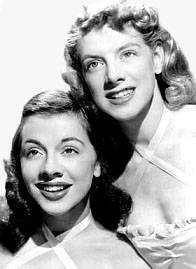
The red-hot singing star became a fixture of Hollywood society, which led to a series of duets, first and foremost her summer 1952 hit with screen siren Marlene Dietrich, "Too Old to Cut the Mustard," a playful put-down on men (whether or not they literally qualified as geezers!), followed by "The Night Before Christmas Song" with "Singing Cowboy" Gene Autry and an appropriately cartoonish audio depiction of Hank Ketcham's "Dennis the Menace" featuring Jimmy Boyd as the title slingshot shooter. In July 1953, Rosie married Oscar-winning Cyrano de Bergerac star Jose Ferrer, a union that spawned the late-'53 novelty hit "Woman (Uh-Huh)" (by Jose) with a comeback, "Man (Uh-Huh)" by Mrs. Ferrer on the flip. Over the course of their 17-year marriage, the couple had five children including well-known actor Miguel Ferrer.
Rosemary's movie career got under way in 1953 with Paramount Pictures. The Stars Are Singing paired her with a teenage Anna Maria Alberghetti and they had a field day with a dozen songs between them, including "Come On-a My House" at last presented in color on the big screen. Here Come the Girls, starring Bob Hope, appeared the same year, followed a few months later by Red Garters, a frontier-set musical comedy that gave Rosie her only top-billed role. Her singing career reached new heights in the summer of '54 with a two-sided smash; "Hey There" ('...you with the stars in your eyes...'), a Richard Adler-Jerry Ross song, scored for Sammy Davis Jr., though it was seriously overshadowed by Rosie's version, which locked down the number one spot from late September through early November. Then the flip side, Stuart Hamblen's "This Ole House" (his original was a top C&W hit at the time), also reached the top, a very rare case of two sides of a single record hitting number one in separate chart runs.
Paramount's White Christmas was released in the fall of 1954, teaming her with Bing Crosby, the originator of the film's 12-year-old title hit (which to this day remains the top-selling song in all of recording history). The classic holiday movie features 17 songs, all penned by Irving Berlin, including "Sisters," done in a duet with Vera-Ellen (a star of several big screen musicals in the '40s and '50s), while on record, Ro and Bet reunited for a rousing rendition; this was the only recording on Columbia for Betty (who'd gone back to the correct "y" spelling). She had been making records for Coral since 1953 and afterwards signed with RCA Victor's "X" label for a couple of singles. Big sis scored another top ten hit that fall with Bob Merrill's timely paisano dance novelty "Mambo Italiano," but her movie career halted abruptly after Deep in My Heart had a theatrical run at the end of the year.
While Betty Clooney enjoyed a solid series of bookings in supper clubs, her records never caught on and she went into semi-retirement. Rosemary's career shifted gears as her string of hits began tapering off; there were novelty tunes like "Pet Me, Poppa" and serious romantic efforts like "Memories of You" with The Benny Goodman Trio, but she made a bigger splash on television with two variety series: The Rosemary Clooney Show, a half hour affair produced for syndication starting in May 1956, and The Lux Show Starring Rosemary Clooney the following season, also running 30 minutes, an early color series on NBC (a Thanksgiving '57 episode featured hubby Jose and siblings Nick, Betty and half sister Gail Stone). She picked up two Emmy nominations, the first in '56 for Best Female Singer, the second a year later for Best Female Personality.
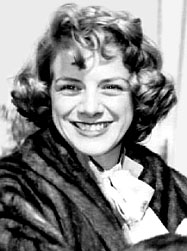
Her 1957 hit "Mangos" suggested even more exotic fruits (...'papayas, chestnuts...pie from the peach!') were being stocked in her pantry. Sales fell off after this and appearances seemed scarce for awhile; her association with Columbia was over by the end of the decade. She made some fine recordings for RCA Victor including "Many a Wonderful Moment" in '60 and a '61 remake of Don Gibson's "Give Myself a Party" from an entire album of pop-slanted country songs (a developing trend towards modernizing the genre). She and Ferrer divorced around this time but remarried, then divorced again for good in 1967. There was one final hit, albeit a minor one, in 1968 with Burt Bacharach and Hal David's '...egg to fry' song "One Less Bell to Answer," which had been recorded the previous year by Keely Smith; it ended up being a giant hit for The 5th Dimension in 1970.
She struggled to keep her career on track in the '70s and '80s. There were bouts with drugs, a nervous breakdown during a live show, and weight issues later in life, but she continued performing in venues small and larger while retaining her fabulous vocal skill. Sister Betty Clooney's death from an aneurysm, in 1976 at just 45 years of age, came as a shock, though Rosie's response was to start the Betty Clooney Foundation, which assists survivors of brain trauma.
A guest role on a 1994 episode of NBC's high-rated series ER (which starred her nephew George Clooney, Nick's son) resulted in an Emmy nomination (her first for acting and third total) in the category Outstanding Guest Actress in a Drama Series. Though diagnosed with lung cancer in 2001, the accolades continued: she received Grammy's lifetime achievement award in 2002, a few months before passing away at age 74. Rosemary Clooney's music and film appearances endure as an invitation to c'mon-a her house any time for some good memories and great entertainment.
NOTABLE SINGLES:
- You Started Something - 1948
by Tony Pastor with Rosemary Clooney / - It's Like Taking Candy From a Baby - 1949
by Tony Pastor with Rosemary Clooney - Grieving For You - 1949
by Tony Pastor with Rosemary Clooney - "A" - You're Adorable (The Alphabet Song) - 1949
by Tony Pastor with the Clooney Sisters - You're Just in Love - 1951
with Guy Mitchell - Beautiful Brown Eyes - 1951
- Come On-a My House - 1951
- If Teardrops Were Pennies - 1951
- Be My Life's Companion - 1952
- Tenderly - 1952
- Half as Much - 1952
- Botch-A-Me (Ba-Ba-Baciami Piccina) - 1952
- Too Old to Cut the Mustard - 1952
with Marlene Dietrich - Blues in the Night - 1952
- The Night Before Christmas Song - 1952
with Gene Autry - Dennis the Menace - 1953
with Jimmy Boyd - Woman (Uh-Huh) - 1953
by Jose Ferrer /
Man (Uh-Huh) - 1953 - Hey There /
This Ole House - 1954 - Sisters - 1954
with Betty Clooney - Mambo Italiano - 1954
- Pet Me, Poppa - 1955
- The Key to My Heart - 1956
- Memories of You - 1956
by the Benny Goodman Trio with Rosemary Clooney - I Could Have Danced All Night /
I've Grown Accustomed to Your Face - 1956 - Mangos - 1957
- Many a Wonderful Moment - 1960
- Give Myself a Party - 1961
- One Less Bell to Answer - 1968


